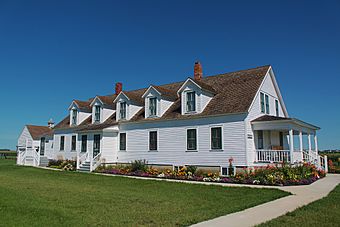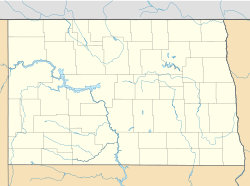Frederick A. and Sophia Bagg Bonanza Farm facts for kids
|
Frederick A. and Sophia Bagg Bonanza Farm
|
|
 |
|
| Location | Mooreton Township, Richland County, North Dakota, USA |
|---|---|
| Nearest city | Mooreton, North Dakota |
| Area | 11.6 acres (4.7 ha) |
| Built | 1915 |
| NRHP reference No. | 85002832 |
Quick facts for kids Significant dates |
|
| Added to NRHP | November 14, 1985 |
| Designated NHLD | April 5, 2005 |
The Frederick A. and Sophia Bagg Bonanza Farm is a very special place in Richland County, North Dakota. It was a huge farm, sometimes called the Bagg Bonanza Farm, that operated like a factory. Frederick and Sophia Bagg ran this farm from about 1915 to 1935.
At its largest, the farm covered 7,000 acres (2,800 ha) of land. The Baggs used modern business ideas to grow crops. Today, the farm complex is a museum. It helps people learn about how farming used to be done on a very large scale. It is one of the best-preserved examples of a bonanza farm in the United States. Because of its history, it was named a National Historic Landmark in 2005. The farm is located about 1 mile (1.6 km) south of Mooreton, North Dakota.
Exploring the Bagg Bonanza Farm
The Bagg Bonanza Farm is in the countryside of Richland County. It is surrounded by fields that were once part of the huge farm. The main area has many buildings. These include homes for people and barns for animals, feed, and farm tools.
The buildings are set up in neat rows. They have a simple style without much fancy decoration. The main house was actually a bunkhouse from another farm. The Baggs moved it and made it their family home. They also housed many farm workers there.
How the Bagg Farm Started
Frederick Bagg was a foreman, and Sophia Bagg was a cook at a nearby farm. In the 1890s, they started buying land to create their own farm. By 1915, their dream farm was ready.
Frederick Bagg thought of his farm as a "factory." He used ideas from big businesses, like dividing up tasks and managing costs. These ideas helped him run the farm very efficiently.
Crops and Growth
The Bagg Bonanza Farm mainly grew wheat, corn, and clover. The size of the farm changed over time. At its biggest, it was about 7,000 acres (2,800 ha).
Large farms like this became possible because of railroads. Trains could carry huge amounts of harvested crops to markets far away. This helped the farm sell its products. Frederick Bagg later divided the farm among his five children and two important workers.
 | John T. Biggers |
 | Thomas Blackshear |
 | Mark Bradford |
 | Beverly Buchanan |



